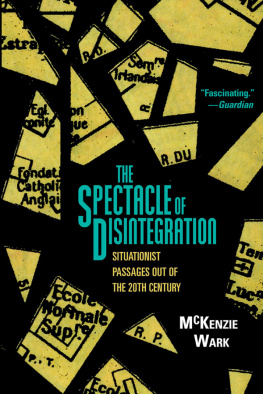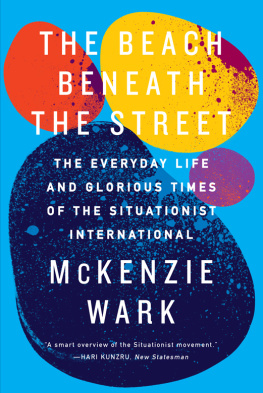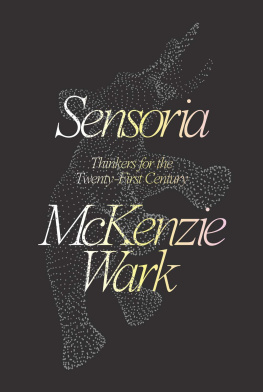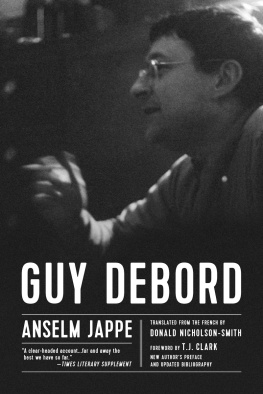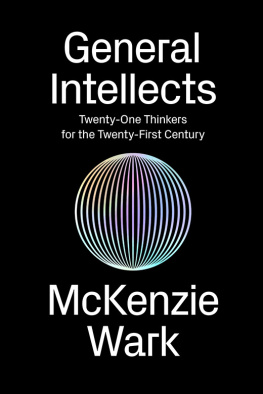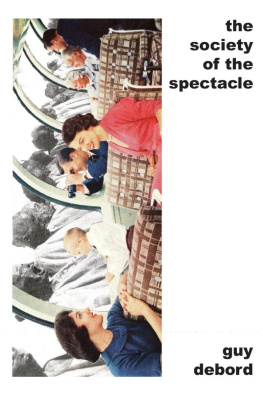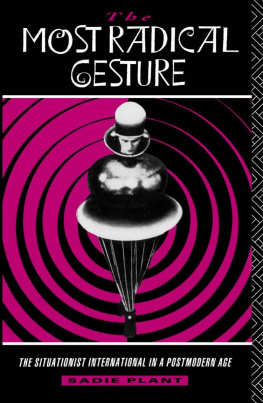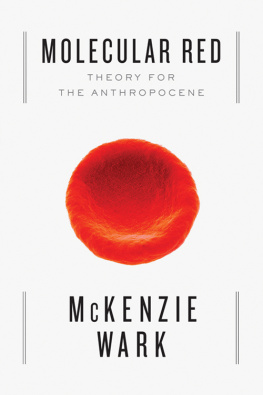
THE SPECTACLE OF DISINTEGRATION

McKENZIE WARK

In memory of:
Mark Poster
The mode of information
Bernard Smith
Place, taste and tradition
Adam Cullen
The otherness when it comes
It may not be what it looks to lack totality.
Anna Mendelssohn
I sense the River Neckinger beneath the paving slabs, the queasy toxicity shifting to St. Saviours dock.
Laura Oldfield Ford
Contents
A person of sharp observation and sound judgment governs objects rather than being governed by them.
Baltasar Gracin
When the storm hit the Hansa Carrier, twenty-one shipping containers fell from its decks into the Pacific Ocean, taking some 80,000 Nike sneakers with them. Seattle-based oceanographer Curtis Ebbesmeyer used the serial numbers from the sneakers that washed up on the rain coast of North America to plot the widening gyre of ocean-going garbage that usually lies between California and Hawaii. Bigger than the state of Texas, it is called the North Pacific Subtropical Gyre, and sailors have known for a long time to steer clear of this area from the equator to fifty degrees north.
Its an often windless desert where not much lives. Flotsam gathers and circles, biodegrading into the sea. Unless it is plastic, which merely photo-degrades in the sun, disintegrating into smaller and smaller bits of sameness. Now the sea here has more particles of plastic than plankton. The Gyre is a disowned country of furniture, fridges, cigarette lighters, televisions, bobbing in the sea and slowly falling apart, but refusing to go away.
New Hawaii is the name some humorists prefer for the North Pacific Subtropical Gyre now that it has the convenience of contemporary consumer goods. Or one might call it a spectacle of disintegration. It is as good an emblem as any of the passing show of contemporary life, with its jetsam of jostling plastic artifacts, all twisting higgledy-piggledy on and below the surface of the ocean. Plastic and ocean remain separate, even as the plastic breaks up and permeates the water, insinuating itself into it but always alien to it.
The poet Lautramont once wrote: Old Ocean, you are the symbol of identity: always equal to yourself and if somewhere your waves are enraged, further off in some other zone they are in the most complete calm. But this no longer describes the ocean, which now appears as far from equilibrium. It describes instead the spectacle, the Sargasso Sea of images, a perpetual calm surrounded by turbulence, at the center always the same.
When Guy Debord published The Society of the Spectacle (1967), he thought there were two kinds: the concentrated and the diffuse spectacle. The concentrated spectacle was limited to fascist and Stalinist states, where the spectacle cohered around a cult of personality. These are rare now, if not entirely extinct. The diffuse spectacle emerged as the dominant form. It did not require a Stalin or Mao as its central image. Big Brother is no longer watching you. In His place is little sister and her friends: endless pictures of models and other pretty things. The diffuse spectacle murmured to its sleeping peoples: what appears is good; what is good appears.
The victory of the diffuse spectacle over its concentrated cousin did not lead to the diffusion of the victor over the surface of the world. In Comments on the Society of the Spectacle (1988), Debord thought instead that an integrated spectacle had subsumed elements of both into a new spectacular universe. While on the surface it looked like the diffuse spectacle, which molds desire in the form of the commodity, it bore within it aspects of concentration, notably an occulted state , where power tends to become less and less transparent.
That the state is a mystery to its subjects is to be expected; that it could become occult even to its rulers is something else. The integrated spectacle not only extended the spectacle outwards, but also inwards; the falsification of the world had reached by this point even those in charge of it. Debord wrote in 1978 that it has become ungovernable, this wasteland, where new sufferings are disguised with the names of former pleasures; and where the people are so afraid Rumor has it that those who were expropriating it have, to crown it all, mislaid it. Here is a civilization which is on fire, capsizing and sinking completely. Ah! Fine torpedoeing!
Since he died in 1994, Debord did not live to see the most fecund and feculent form of this marvel, this spectacular power that integrates both diffusion and concentration. In memory of Debord, lets call the endpoint reached by the integrated spectacle the disintegrating spectacle , in which the spectator gets to watch the withering away of the old order, ground down to near nothingness by its own steady divergence from any apprehension of itself. Debord: that state can no longer be led strategically.
And yet the spectacle remains, circling itself, bewildering itself. Everything is impregnated with tiny bits of its issue, yet the new world remains stillborn. The spectacle atomizes and diffuses itself throughout not only the social body but its sustaining landscape as well. As Debords former comrade T. J. Clark writes, this world is not capital accumulated to the point where it becomes image, to quote the famous phrase from Guy Debord, but images dispersed and accelerated until they become the true and sufficient commodities.
The spectacle speaks the language of command. The command of the concentrated spectacle was: OBEY! The command of the diffuse spectacle was: BUY! In the integrated spectacle the commands to OBEY! and BUY! became interchangeable. Now the command of the disintegrating spectacle is: RECYCLE! Like oceanic amoeba choking on granulated shopping bags, the spectacle can now only go forward by evolving the ability to eat its own shit.
The disintegrating spectacle can countenance the end of everything except the end of itself. It can contemplate with equanimity melting ice sheets, seas of junk, peak oil, but the spectacle itself lives on. It is immune to particular criticisms. Mustapha Khayati: Fourier long ago exposed the methodological myopia of treating fundamental questions without relating them to modern society as a whole. The fetishism of facts masks the essential category, the mass of details obscures the totality.
Even when it speaks of disintegration, the spectacle is all about particulars. The plastic Pacific, even if it is as big as Texas, is presented as a particular event. Particular criticisms hold the spectacle to account for falsifying this image or that story, but in the process thereby merely add legitimacy to the spectacles claim that it can in general be a vehicle for the true. A genuinely critical approach to the spectacle starts from the opposite premise: that it may present from time to time a true fragment, but it is necessarily false as a whole . Debord: In a world that really has been turned on its head, the true is a moment of falsehood.
This then is our task: a critique of the spectacle as a whole, a task that critical thought has for the most part abandoned. Stupefied by its own powerlessness, critical thought turned into that drunk who, having lost the car keys, searches for them under the street lamp. The drunk knows that the keys disappeared in that murky puddle, where it is dark, but finds it is easier to search for them under the lamp, where there is lightif not enlightenment.
And then critical theory gave up even that search and fell asleep at the side of the road. Just as well. It was in no condition to drive. In its stupor, critical thought makes a fetish of particular aspects of the spectacular organization of life. The critique of content became a contented critique. It wants to talk only of the political, or of culture, or of subjectivity, as if these things still existed, as if they had not been colonized by the spectacle and rendered mere excrescences of its general movement. Critical thought contented itself with arriving late on the scene and picking through the fragments. Or, critical thought retreated into the totality of philosophy. It had a bone to pick with metaphysics . It shrank from the spectacle, which is philosophy made concrete. In short: critical thought has itself become spectacular. Critical theory becomes hypocritical theory. It needs to be renewed not only in content but in form.
Next page
